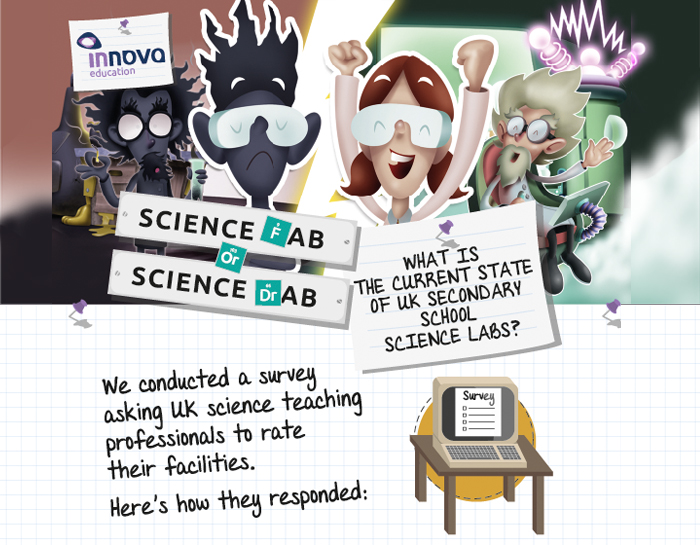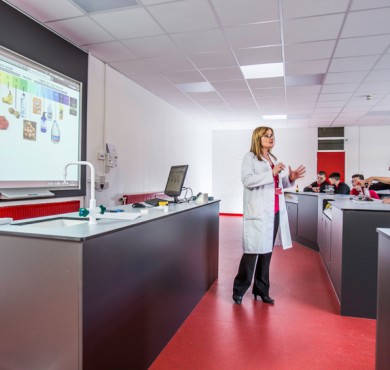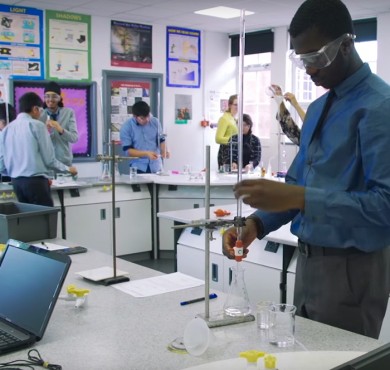Lifting the Lid on Low-Grade School Science Labs
To help build a picture of the overall quality of secondary school science labs in the UK, we conducted a survey with leading teaching professionals - and the results offer some real insights.
Here’s what we found out:
The Results
The survey into the standard of UK secondary school science labs has revealed that a shocking 49.5% of teaching professionals are not confident about pupil safety in science lessons.
The study conducted by leading education interior specialist, Innova Design Group, also revealed that a damning 63% of respondents view science labs as low tech, with 11% saying their facilities are very low tech.
Where safety and technology fared badly – the overall suitability of labs came out terribly with 85% of respondents stating that facilities don’t bring out the best in themselves or pupils.
With 69% of respondents reporting that facilities had been recently refurbished – the results raise concerns about the ineffective use of public funds and throw commissioning and procurement into focus.
According to Melanie Laing, director of Innova Design Group, the statistics strengthen the already compelling case for the government to review policy, targets, procurement and budgets in order to improve the quality and safety of UK school science labs.
Melanie adds: “When it comes to learning, nothing is more important than pupil safety – particularly in the field of science where hazardous materials and substances are used routinely. Parents will be rightly concerned to learn that leaders don’t feel confident facilities are raising levels of pupil safety.
“With many well-funded, government-endorsed STEM initiatives, we should be in a position where health and safety can be taken for granted in school science labs. However the squeeze on education budgets combined with rushed and poorly allocated spending has left facilities falling short.
“In the same way that STEM policy cannot be successful without sufficient funding, the next generation of scientists cannot be trained in unsuitable and uninspiring laboratories. As such, we need to free up spending, maximise use of budget and get it right first time in order to attract and retain quality science teachers that can equip the next generation of scientists with skills to keep the UK at the leading edge of international development.
“To deliver excellence, facilities should incorporate technology, be designed to inspire and should use shortened lines of communication that help to improve concentration and subsequently attainment.”
Innova’s study also found that 39% of teaching professionals think science labs are badly laid out for individual, group, practical and theory lessons meaning they lack versatility.
Melanie concludes: “To increase the quality and productivity of UK science we need to set targets that are realistic and achievable. And to deliver results in science and STEM, teachers require facilities that empower them to inspire pupils and nurture their potential.
“However the reality is, proportionally dwindling numbers of overworked teachers are facing mounting pressure to deliver without the necessary tools as they are teaching in labs that are low tech and unfit to inspire.
“It is essential that policymakers unlock funds to improve the standard of facilities – otherwise the UK risks losing its place as an international leader in the lucrative field of the sciences.”
Drab lab?
If your lab is drab, don’t worry! Here at Innova Design Group we specialise in designing, manufacturing and installing inspirational learning spaces that never fail to make an impact.
From cutting edge science laboratories to stimulating technology rooms, ICT suites and libraries – we’ve created and installed hundreds of inspirational interiors across the UK.
Contact
If you’re looking to transform your interiors, contact us now on 0161 477 5300 or email hello@innovadesigngroup.co.uk.





